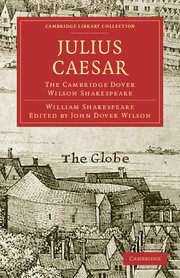THE STAGE-HISTORY OF JULIUS CÆSAR
Published online by Cambridge University Press: 07 September 2010
Summary
Popularity tempered with recurrent neglect is the mark of Julius Cæsar as a stage play. London witnessed it almost every year from the late seventeenth to the last quarter of the eighteenth century; yet three of our most famous actors never appeared in it, and twice over for an extended period (1780–1812 and 1851–98) its stage history is a virtual blank. Part of the explanation may be that it hardly provides actors with a supremely tragic role, while it offers even less scope for great actresses. But its opportunities for pageantry made it one of Tree's most resounding triumphs, when he ended its longest eclipse with nine successful revivals at His Majesty's Theatre from 1898 to 1913.
The earliest notice of it, as already shown, is by a Swiss traveller, Thomas Platter, who witnessed a performance at The Globe on 21 September 1599. Thereafter till the closing of the theatres in 1642 it seems to have been a popular favourite. Thus Leonard Digges in his Verses Commendatory to Shakespeare's Poems (1640) writes:
So have I seen when Cassar would appeare,
And on the Stage at half-sword parley were,
Brutus and Cassius; Oh how the audience,
Were ravished, with what wonder they went thence;
and he contrasts this reception with the impatience shown at Ben Jonson's ‘tedious (though well-laboured)’ Roman plays. It was also presented several times at Court—for example, at the festivities for the marriage of Princess Elizabeth and the Elector Palatine in the winter of 1612–13, and again as late as 31 January 1637, and 13 November 1638.
- Type
- Chapter
- Information
- Julius CaesarThe Cambridge Dover Wilson Shakespeare, pp. xxxiv - xlviPublisher: Cambridge University PressPrint publication year: 2009First published in: 1949



